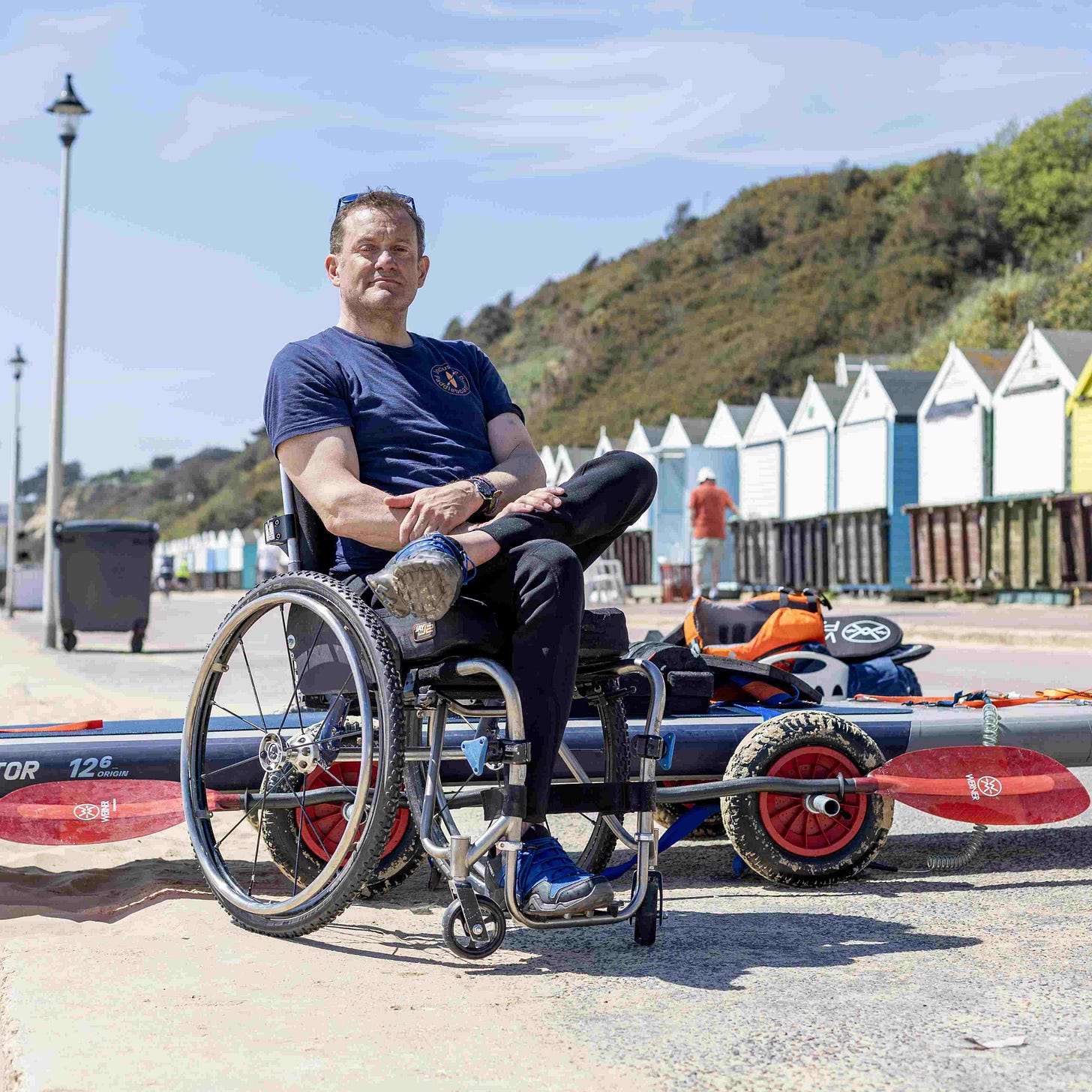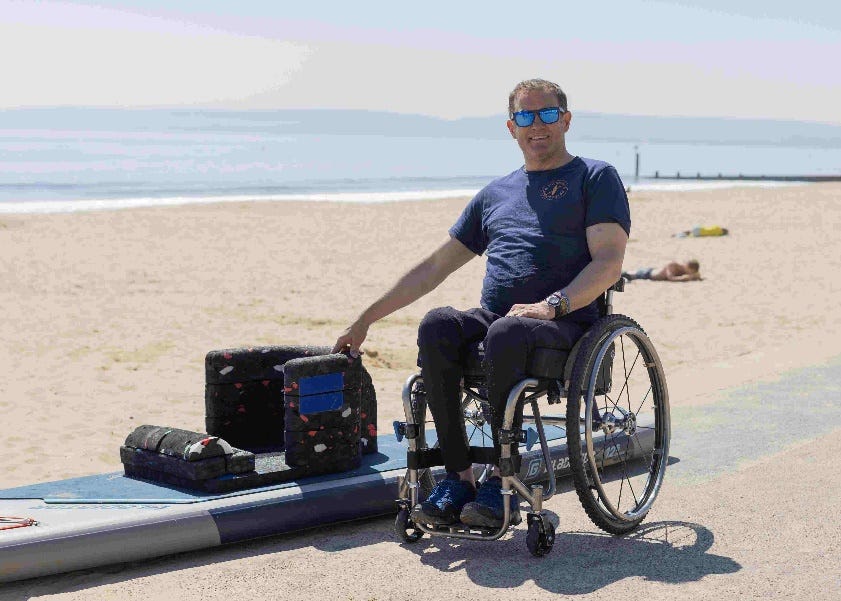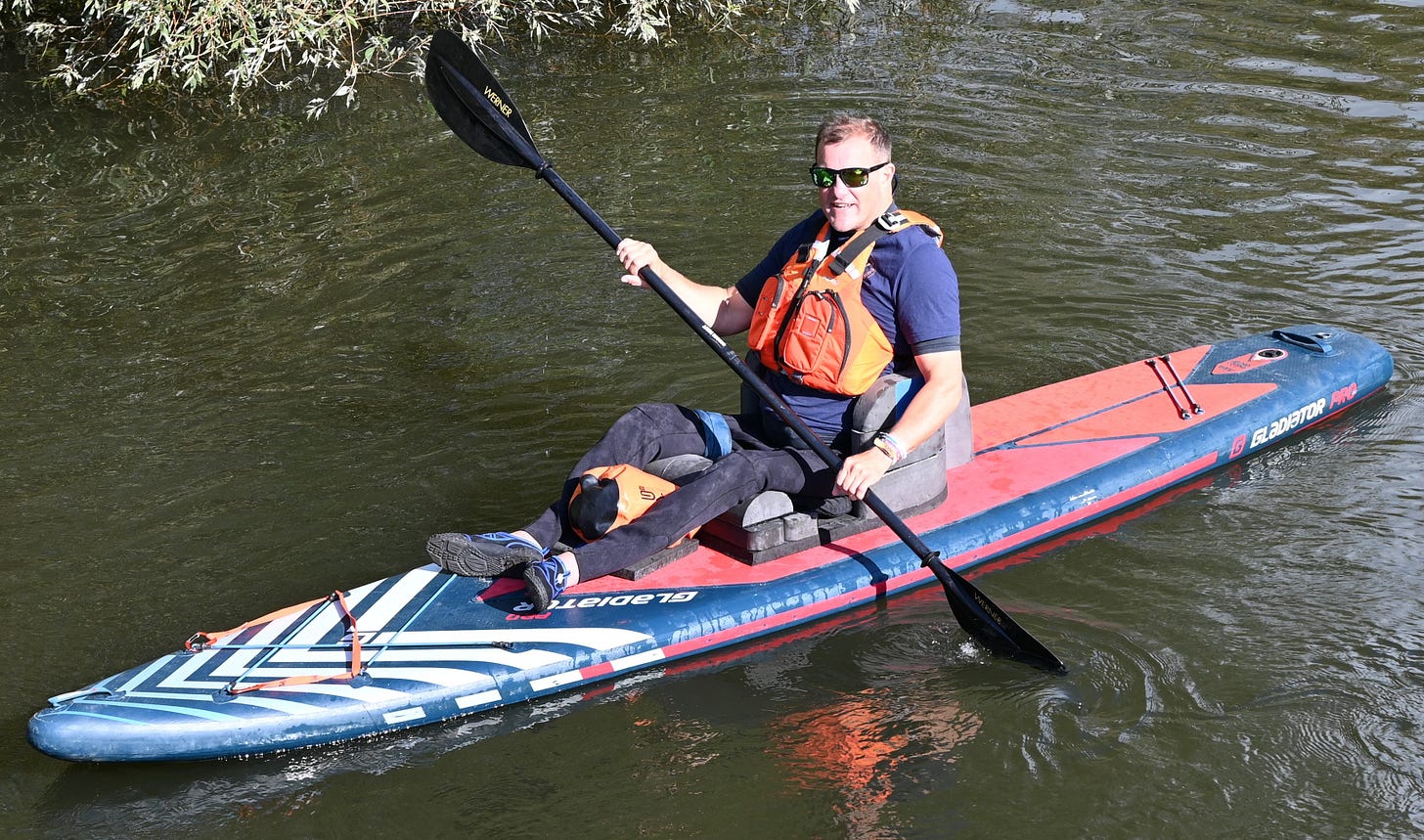Why can't I access the beach?
Designer and paddleboarder Will Behenna is on a mission to find out the real demand for Beach Access from people with medical and mental health issues and disabilities. Here's the story so far...
Stunned by the lack of beach access in the UK, designer and paddleboarder Will Behenna is on a mission to find out the real demand for Beach Access from people with medical and mental health issues and disabilities. Here’s the story so far…

We all love planning a trip to the sea, but for Will Behenna finding a suitable route on to the water is a hugely tricky part of researching a day out. That’s because he loves to paddleboard, but on land uses a wheelchair which are useless at crossing tussocky, rocky or sandy beaches.
So even though Will, 53, lives in Devon, which has more than 130 beaches, there are few sites where he can launch safely.
Ingeniously he’s even built a 15-metre beach path that can be rolled out across the sand and just about fits into his car boot.
But it wasn’t until Will went on holiday to Spain, which has around 600 fully accessible beaches, that he began to wonder why he needed to bring his DIY sand mat whenever he wanted to go for a paddle in the sea. Or why there were so few changing rooms at the beach suitable for people with disabilities. Or a central website with this info.
“There are 16.1 million people in the UK with a disability but there are no guidelines regards access to blue space,” explains Will.
“So, we have the disability discrimination act which covers access to buildings, services, and lots of access guidelines for green space in terms of parks, cycle tracks, Forestry Commission sites but nothing for blue space. At the same time there’s general recognition that access to green and blue space is good for our physical and emotional wellbeing and has health benefits,” he adds.
But in the UK access to rivers, canals, lakes and the sea, and the infrastructure to support it, is not just missing, it’s barely mentioned even though beach access is a growing trend around the world.

Get me to the beach
Australia has 200 fully accessible beaches, Greece has nearly 300, while America boasts even more. In California the state claims all its beaches are accessible with walkways over the sand, opportunities to use free or rentable beach wheelchairs and sand mats (like Will’s homemade mat) plus bookable parking, accessible washrooms at the beach, signage to the beach ramps and updated online information.
The Middle East resorts also have many accessible beaches.
Here in the UK with its 7,000 miles of coastline and 1,500 beaches “we only have a handful of beaches that have beach wheelchairs and accessible changing toilet facilities, that’s it. Nothing interconnects like accessible parking, or even the pathway to the toilets and on to the beach, or how to get on to the water,” says Will who paddleboards all year round.
Turns out there’s a good reason, no one’s thought about it universal beach access.
“We have no evidence in the UK how people with disabilities and medical conditions feel about the beach. No one has ever asked that question,” says Will, who is also on Paddle UK’s Inclusion Advisory Group.
“I’ve been injured for 37 years, and before my accident I grew up in Cornwall, but it’s only just occurred to me! A lot of the aging population will have been to Spain and seen the beach access, and yet we just have never done anything about it,” says Will who’s determined to help bring in some changes.
In a collaboration with 14 students at Falmouth University’s sustainable product design department and Bournemouth University’s media production department Will launched the Beach Access Survey this month (June) to get organisations to sign up and support the need to improve beach access in the UK for people with medical and mental health issues and disabilities.
Already 80 groups have signed, with this first research phase closing at the end of September.
“Around a quarter of the population have a long-term health problem,” adds Will, “and people with poor mental health might have different issues to mine. The Beach Access Survey is trying to cover as many people as possible. I’ve experienced all those three things… and those three groups also cover the aging population, or if something is going on with their body or brain.”

The power of Vitamin Sea
Most of us don’t just love a day out at the beach, we get a real wellbeing boost from it too. With the Beach Access Project Will hopes to do more than see a network of beach paths. He wants to more widely share those feelgood vibes and at the same time create more community connection. His vision is to “enhance and improve beach access to enable people with medical/mental health conditions and disabilities to play a meaningful and active role in beach life and blue space.” That could mean developing beach access kits in a box – from mats to specially adapted wheels - that wheelchair users and others could book on line and borrow on their seaside visit.
“What’s critical is realising it’s not just access on to the beach,” says Will. “It’s also access into the water where the health benefits are. We have this amazing environment which is effectively excluding anyone with mobility issues or balance and coordination issues or adults with significant coordination or medical conditions. My key driver is around paddleboarding as I’m pretty convinced that we can get the majority of people on the water whether lying, sitting or kneeling on a board, but we have no means of doing it. That’s where the Beach Access Project is coming from, and it starts by asking slightly awkward questions.”
It was Voltaire who infamously said, “judge a man by his questions, rather than his answers”. Now thanks to Will Behenna asking ‘why’ something is (or isn’t) happening the unwritten rule book about just who is able to access the UK’s rivers, canals and, especially, beaches looks set for some very beneficial changes.
Over to you
See https://beachaccessproject.co.uk/
Share and sign up to the Beach Access Project survey (open until 30 September 2025) https://beachaccessproject.co.uk/the-survey/
Follow Will Behenna on instagram @inclusivepaddleboarding or contact him on will@beachaccessproject.co.uk

